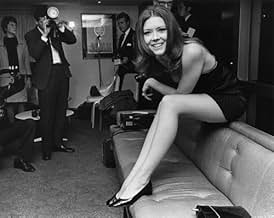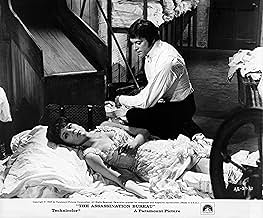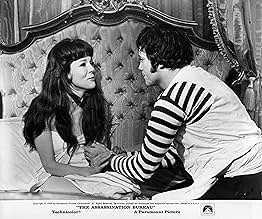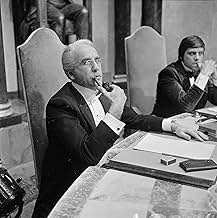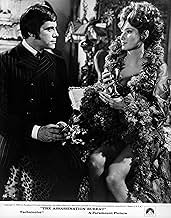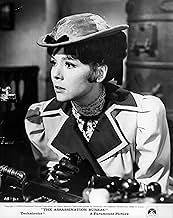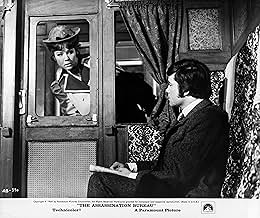Oliver Reed und Diana Rigg führen eine glänzende Besetzung an in Mörder GmbH, einer geistreichen Gaunerkomödie inspiriert durch ein Buch, dessen Co-Autor Jack London war.Oliver Reed und Diana Rigg führen eine glänzende Besetzung an in Mörder GmbH, einer geistreichen Gaunerkomödie inspiriert durch ein Buch, dessen Co-Autor Jack London war.Oliver Reed und Diana Rigg führen eine glänzende Besetzung an in Mörder GmbH, einer geistreichen Gaunerkomödie inspiriert durch ein Buch, dessen Co-Autor Jack London war.
- Auszeichnungen
- 2 Nominierungen insgesamt
- Gen. von Pinck
- (as Curt Jurgens)
- Police Inspector
- (Nicht genannt)
- French President
- (Nicht genannt)
- French President
- (Nicht genannt)
Empfohlene Bewertungen
This is probably my favorite Oliver Reed performance. He grabs the role of the debonair gentleman assassin and turns it into uniquely his own. Some of his dry line delivery, particularly when sparring with Rigg, is priceless; my favorite is when they meet and she informs him who she wants killed; he soon demands her reasons, yelling "Is That it? Is That It!?!" Later in the film, she calls him annoying. "I have been told that," he replies, but never have we heard the line spoken that way. He needs to carry the picture, outsmarting and fooling all the other sneaky assassins out for his blood with disguises, role-playing and careless bravado. This is where the picture really shifts into high gear, turning into a duel among a group of master killers who, luckily, do not yet have the advantages of 20th century weaponry. The supporting cast are all terrific, including Savalas as Reed's main nemesis, Jurgens as a German general and Noiret who, besides being an assassin, also runs a brothel (no limits to the French).
The script and dialog are continually witty throughout, many of the lines classic and too numerous to mention here. Again, some of this may be lost on anyone under 30 years old; in a way, this brand of humor can now be termed sophisticated - no gross bodily function joking. It does revolve around death, so a kind of dark farce results, of course - yet it's not morbid. That's probably because most of the victims deserve their ends as presented here; they made their beds, as it were. The dialog is complemented by inventive turns in the plot; there's actually quite a bit of suspense as the story turns & twists here and there, especially during the sequence in Venice, where the order of characters being killed is not as expected. The finale is also suspenseful - you may wonder how Reed will pull it off, stopping an entire zeppelin and its crew. And please keep in mind the special FX are over 35 years old, as well. Just glorious stuff.
Oliver Reed is suavely bucaneering as the main protaganist, while the other main star, Diana Rigg of Avengers fame, does a very well-judged comic performance as the feminist journalist in 1910. It's a shame she didn't appear in more films. No other actors get much of a chance to shine, as there are far too many minor characters.
The writing is OK; you get the feeling that there should be more laughs than there are. Still, it's an enjoyable enough way to spend an hour and a half.
Rating:- *** (out of *****)
Actually he's sharper than that: THE CALL OF THE WILD and WHITE FANG were his attempts to tell a story from an animals' point of view. THE SEA WOLF is his attempt to attack the prevalent socio-economic doctrine of the day (1900): Social Darwinism, as practiced by Captain Wolf Larsen. He wrote one of the first good novels about America under a dictatorship: THE IRON HEEL. He discussed his early life in MARTIN EDEN. He discussed his alcoholism in his book JOHN BARLEYCORN. He was the first American novelist of real international stature to embrace socialism! A reporter as well as writer, his experiences watching the Japanese government prevent him from carrying out his job during the Russo - Japanese War turned him into a perpetually hostile critic of Japan's goals in the Pacific (although, to be fair to the Japanese, London did show some racism here).
Keeping this in mind, one realizes that THE ASSASSINATION BUREAU, LTD. has to be tackled differently from say THE CALL OF THE WILD or the short story TO BUILD A FIRE. London is looking with jaundice eye at the political system that had ruled Europe (and most of the world) since 1815 or so. It was oppressive and uneven, and even in the United States (probably the best major power to live in in terms of opportunity and social mobility) it was still badly flawed.
Assassination had become a serious tool for trying to influence European affairs from 1881 to 1910 (when the novel was begun by London). Tsar Alexander II of Russia was blown to bits in 1881 by a Nihilist group called "The People's Will". Although it was captured and most of its members hanged, others copied it. Assassinations continued in Russia up to 1911 including Interior Grand Duke Serge in 1904,Minister Von Phleve in 1905, and Prime Minister Peter Stolypin in 1911. Elsewhere the other states suffered. Presidents Garfield and McKinley were assassinated in 1881 and 1901 (the latter by a self-proclaimed anarchist). President Sadi Carnot of France was stabbed to death in a public parade in 1894, in the middle of a series of anarchist attacks (including a bombing at the Chambre of Deputies). Empress Elisabeth of Austria-Hungary, King Umberto I of Italy, the Prime Minister of Spain, King Carlos III of Portugal, were all killed. So were Lord Frederick Cavendish and Thomas Burke by Irish nationalists in Phoenix Park in 1882. Many smaller public figures were killed as well. The topic of an "assassination bureau" was timely - especially as some of these victims fit what the bureau decided: were the targets worthy of being assassinated.
Of course not all of them were (Empress Elisabeth for example). But London's vision was not totally flawed. It was just that being a realist he knew that the "pure" idea of the bureau would be corrupted sooner or later. So his plot involves the head of this international bureau being offered a huge reward if he orders his own assassination. Note that Oliver Reed's character is a Russian, as though the author knew who was most likely to be the head of an assassination group.
Probably due to other commitments London never finished the novel. Robert L. Fish, a successful mystery novelist, wrote a completion which was rather amusing. I tend to believe that was an error - London was seldom an amusing writer. The film treats the moral issue as a joke, and uses the characters as caricatures of the nations they represent (the doleful Russian, the gluttonous and sexually active Italian, the pragmatic Frenchmen who runs a bordello too, the English newspaper tycoon). These characters need good performers, and Philippe Noiret is on target as the bordello owner/assassin leader); and (although not Italian) Clive Revill is quite good as the Italian. The Russian (it's not Reed) is doleful, but hardly memorable. As for Lord Bostwick, Telly Savalas is not convincing as an English aristocrat (one can't even imagine him as a Canadian transplant to England, like Spencer Tracy in EDWARD, MY SON). Curt Jurgens' German assassination leader, General Von Pinck (the name suggested, perhaps, by his handiness with a sword) is either sadistically high-spirited or vicious: no other characteristics there.
Diana Rigg, as the budding journalist who's first job is actually as a cats-paw for Savalas (her boss) is pretty good, but her performance as Vincent Price's daughter in THEATRE OF BLOOD was livelier. She seems determined to maintain her suffragette style dignity here no matter what. However it happens to work for the film. As for Reed, his straight villains were usually far better than his heroes. He appears to be too laid back at times. A bit more jittery behavior would have been better.
One final point: One minor character, an Austrian nobleman marked for death, is killed when he cuts into a large knock-wurst (that has a bomb in it). This gag probably is not original but it was reused in the television movie MORE WILD WILD WEST with Jonathan Winters as the victim.
Wusstest du schon
- WissenswertesJack London's original novel was left markedly incomplete at the time of his death, and it was not until many decades later that the thriller-writer Robert L. Fish (also known as Robert L. Pike) finished it for publication, amidst much publicity. The novel is noticeably more serious in tone than this movie, although a New York Times review at the time called it "delightfully ridiculous."
- PatzerIn the scene about 40-45 minutes in where Lord Bostwick visits General Van Pinck whilst the latter is at fencing practice, there's a map of Europe on the wall. Although this film ostensibly takes place before World War I, the map is of post-Versailles Europe, c.1925-1939.
- Zitate
Miss Winter: With your ideas, I'm surprised you're shocked at the thought of war.
Ivan Dragomiloff: Not at all. It's purely a matter of business. How can we charge our sort of prices with everybody happily killing each other for a shilling a day?
Top-Auswahl
- How long is The Assassination Bureau?Powered by Alexa
Details
- Erscheinungsdatum
- Herkunftsland
- Sprachen
- Auch bekannt als
- Die Mörder GmbH
- Drehorte
- Zürich, Kanton Zürich, Schweiz(reconstructed in studio set)
- Produktionsfirma
- Weitere beteiligte Unternehmen bei IMDbPro anzeigen
- Laufzeit1 Stunde 50 Minuten
- Sound-Mix
- Seitenverhältnis
- 1.85 : 1
Zu dieser Seite beitragen


